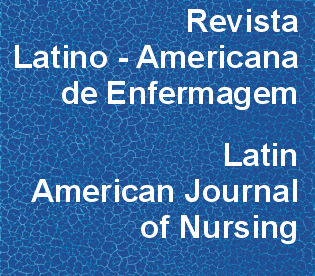Self-Care Behaviors and Health Indicators in Adults with Type 2 Diabetes
DOI:
https://doi.org/10.1590/S0104-11692010000400003Keywords:
Self-Care, Health Status Indicators, Diabetes Mellitus, Type 2Abstract
This descriptive correlational study aimed to analyze self-care behaviors and their relationship with health indicators represented by glycemic control, lipid profile, Body Mass Index [BMI], waist circumference and body fat percentage in a sample of 98 adults with type 2 diabetes in an area of Nuevo Leon, Mexico (August 2005/May 2006). The results showed a low self-care behaviors index ( ; or = 36.94, SD=15.14). A significant relationship was found between self-care behaviors and glycosilated hemoglobin [HbA1c] (r s=-.379, p<.001), triglycerides (r s=-.208, p=.040), BMI (r s=-.248, p=.014) and body fat percentage (r s=-.221, p=.029). Multivariate analysis revealed the influence of self-care behaviors on HbA1c, BMI and body fat percentage with explained variances of 9 to 41% (p < .05). From all self-care dimensions, diet was the most predictive for health indicators, moderated by gender and understanding of diabetes contents (p< .05).
; or = 36.94, SD=15.14). A significant relationship was found between self-care behaviors and glycosilated hemoglobin [HbA1c] (r s=-.379, p<.001), triglycerides (r s=-.208, p=.040), BMI (r s=-.248, p=.014) and body fat percentage (r s=-.221, p=.029). Multivariate analysis revealed the influence of self-care behaviors on HbA1c, BMI and body fat percentage with explained variances of 9 to 41% (p < .05). From all self-care dimensions, diet was the most predictive for health indicators, moderated by gender and understanding of diabetes contents (p< .05).
Downloads
Download data is not yet available.
Downloads
Published
2010-08-01
Issue
Section
Original Articles
License
RLAE’s authorship concept is based on the substantial contribution by each of the individuals listed as authors, mainly in terms of conceiving and planning the research project, collecting or analyzing and interpreting data, writing and critical review. Indication of authors’ names under the article title is limited to six. If more, authors are listed on the online submission form under Acknowledgements. The possibility of including more than six authors will only be examined on multicenter studies, considering the explanations presented by the authors.Including names of authors whose contribution does not fit into the above criteria cannot be justified. Those names can be included in the Acknowledgements section.
Authors are fully responsible for the concepts disseminated in their manuscripts, which do not necessarily reflect the editors’ and editorial board’s opinion.
How to Cite
Compeán Ortiz, L. G., Gallegos Cabriales, E. C., González González, J. G., & Gómez Meza, M. V. (2010). Self-Care Behaviors and Health Indicators in Adults with Type 2 Diabetes . Revista Latino-Americana De Enfermagem, 18(4), 675-680. https://doi.org/10.1590/S0104-11692010000400003



